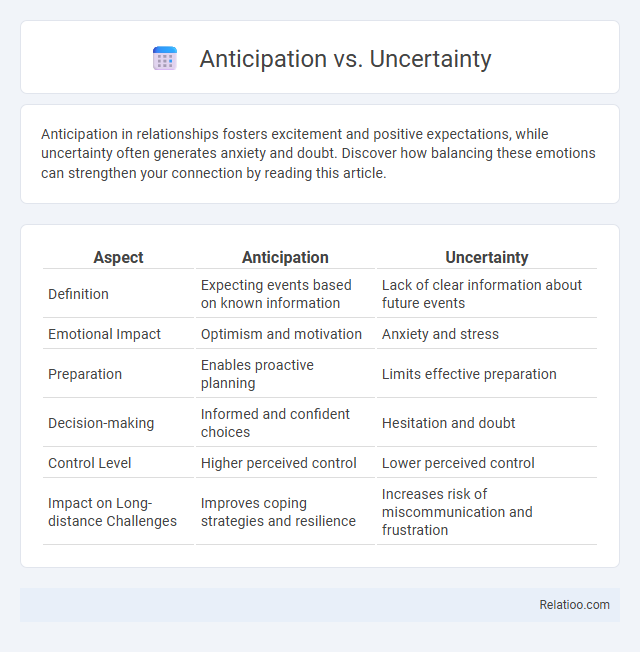Anticipation in relationships fosters excitement and positive expectations, while uncertainty often generates anxiety and doubt. Discover how balancing these emotions can strengthen your connection by reading this article.
Table of Comparison
| Aspect | Anticipation | Uncertainty |
|---|---|---|
| Definition | Expecting events based on known information | Lack of clear information about future events |
| Emotional Impact | Optimism and motivation | Anxiety and stress |
| Preparation | Enables proactive planning | Limits effective preparation |
| Decision-making | Informed and confident choices | Hesitation and doubt |
| Control Level | Higher perceived control | Lower perceived control |
| Impact on Long-distance Challenges | Improves coping strategies and resilience | Increases risk of miscommunication and frustration |
Understanding Anticipation and Uncertainty
Understanding anticipation involves recognizing it as the cognitive process of expecting specific outcomes based on prior knowledge, which helps prepare individuals for future events. Uncertainty, by contrast, refers to the lack of predictability and incomplete information, making it difficult to forecast results accurately. Distinguishing between these concepts is crucial for decision-making, as anticipation allows proactive planning while managing uncertainty requires adaptive strategies and tolerance for ambiguity.
The Psychology Behind Anticipation
The psychology behind anticipation reveals how the brain prepares for expected outcomes by activating reward centers and releasing dopamine, enhancing motivation and focus. Anticipation differs from uncertainty, where the lack of clear expectations triggers anxiety and exploratory behavior as the brain seeks information to reduce unpredictability. Understanding these neural mechanisms offers insights into human decision-making, emotional regulation, and adaptive behaviors in both predictable and ambiguous environments.
How Uncertainty Impacts Decision-Making
Uncertainty significantly affects decision-making by increasing cognitive load and reducing confidence in predicting outcomes. Your ability to anticipate potential scenarios diminishes as ambiguous information limits clarity, often leading to delayed or risk-averse choices. Understanding the interplay between anticipation and uncertainty empowers more strategic and adaptive decisions despite incomplete data.
Emotional Responses to Anticipation vs Uncertainty
Emotional responses to anticipation often involve excitement and positive arousal, driven by the expectation of a future event with perceived control or clarity, enhancing motivation and optimism. In contrast, uncertainty typically triggers anxiety, stress, and emotional discomfort due to the unpredictability and lack of information, activating neural circuits linked to fear and vigilance. Anticipation balanced with uncertainty can create a dynamic emotional state where hope coexists with apprehension, influencing decision-making and cognitive focus.
Anticipation in Goal Setting and Motivation
Anticipation in goal setting acts as a powerful motivator by creating a mental image of future success, which boosts commitment and perseverance toward achieving objectives. Unlike uncertainty, which can paralyze decision-making and reduce motivation, anticipation generates positive emotional arousal that energizes focused action. Harnessing anticipation effectively aligns intrinsic motivation with clear milestones, enhancing goal attainment and sustained effort.
Coping Strategies for Managing Uncertainty
Coping strategies for managing uncertainty emphasize building resilience through mindfulness, goal-setting, and cognitive reframing to reduce anxiety caused by unpredictable situations. You can enhance emotional stability by focusing on what can be controlled while accepting the ambiguity inherent in future events, distinguishing between anticipation and uncertainty. Effective coping also includes seeking social support and practicing adaptive problem-solving to navigate uncertainty with confidence.
Real-Life Examples: Anticipation vs Uncertainty
Anticipation involves expecting specific outcomes, such as a student preparing confidently for a known exam format, while uncertainty arises when the outcome is unpredictable, like awaiting results from a novel medical treatment. For example, investors anticipating quarterly earnings may adjust portfolios strategically, contrasting with the uncertainty experienced during sudden market crashes where future trends are unclear. These distinctions impact decision-making processes, highlighting how anticipation allows for proactive planning whereas uncertainty necessitates adaptive strategies.
The Role of Anticipation in Reducing Stress
Anticipation plays a crucial role in reducing stress by enabling individuals to prepare mentally and emotionally for upcoming events, which lessens the impact of uncertainty. While uncertainty often triggers anxiety due to unknown outcomes, anticipation provides a sense of control and predictability, helping to mitigate stress responses. Effective anticipation strategies include visualization and planning, which enhance resilience and improve stress management in both personal and professional contexts.
Uncertainty and Its Effects on Productivity
Uncertainty in the workplace triggers stress and cognitive overload, impairing decision-making and reducing overall productivity. Employees facing ambiguous goals or unpredictable environments often experience decreased motivation and increased error rates. Clear communication and structured processes help mitigate uncertainty, enhancing focus and performance outcomes.
Balancing Anticipation and Uncertainty for Personal Growth
Balancing anticipation and uncertainty is essential for personal growth, as anticipation drives motivation while uncertainty fosters adaptability. Embracing uncertainty encourages resilience and openness to new experiences, which enhances learning and innovation. Cultivating a mindset that harmonizes both anticipation and uncertainty enables individuals to set realistic goals while navigating unpredictability effectively.

Infographic: Anticipation vs Uncertainty
 relatioo.com
relatioo.com